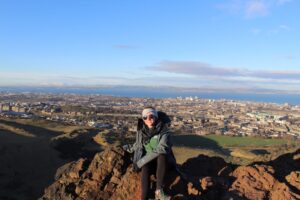Academics Abroad: It’s Not Better It’s Just Different



Nine hours of total class time throughout an entire week may seem like nothing in comparison to the American system where each class has roughly this amount each week. During my time abroad at the University of Edinburgh, I had exactly that. Nine hours of a class per week. On top of that, all of my classes happened to fall on Monday and Tuesday which meant that I had 5 days (including weekends) with no classes. It was very easy to initially assume that my work load would reflect my class schedule–light and minimally intensive –however, this was not the case. I was taking 2 upper division history courses and 1 introductory Science and Technology course that was taught by a professor from the post-graduate department. At the surface level, these classes appeared hands-off and less intensive than those that I had taken at my home institution; however, after my initial introduction to these courses I realized that this assumption was wrong.
Along with weekly readings and a small group project, my two honors history courses revolved around an extensive personal research paper on a topic of interest within the context of the class. This was not the first time that I had written a 3000-word paper; however, it was the first time that I had done it within the Scottish education system. I quickly realized how in-depth professors require the students to go into the material that they are writing about. Within the first few weeks of class, I did not even begin to think about writing these essays; however, most of my classmates had already picked a topic and started research. This shocked me because they all seemed to understand starting early was better where as I was waiting for more instruction from the professor. This was the first point that I realized just how different the Scottish University system is. Those two essay were some of the most extensive and in-depth research papers that I have written throughout college. From my initial assumptions, I would never have anticipated the workload I had for these two classes.
What I learned from this experience is that even though a system may appear “easier” or “less intensive” that does not mean that it is the correct perception. One of the best sayings for students studying abroad is “It’s not worse, better, or easier, it’s just different.” This is a saying I have used many times to remind myself of the differences between cultures. It stops me from jumping to the immediate conclusion that one way of doing something is better than anther, and it encourages me to step back and evaluate what the differences are and why I think it is different. So, in the case of classes abroad, I assumed the rigor of each class could be determined by the number of hours spent in class or on smaller class assignments, which resembles the system of my home institution, instead of realizing that Edinburgh challenged me to think extensively and creatively on a larger project. This idea of different but not better or worse allowed me to broaden my horizons not only in the classroom by learning in a new system but also outside the classroom in exploring the city and finding new activities.
Studying abroad in Edinburgh provided me with a unique perspective on my education. It forced me to step outside of a norm that I had grown accustomed to back home and approach learning from an entirely new perspective. This is something that I did not assume I would face in choosing to go to an English speaking country but that is exactly the point of studying abroad! It allows you the opportunity to experience things from a new perspective and forces you to adapt and grow while doing so. This shift in mindset is something that not only came in handy while abroad but is something that I plan to continue using in my future with graduation quickly approaching. College, studying abroad, applying to jobs, and even internships all come with ups and downs, expected and unexpected, good and bad. Through all of this, it is important to remember that different is just a new experience and opportunity to learn. Whether you are moving to a city for study abroad or accepting a new job in a new place, these same lessons can be applied and allow you to embrace all that a new experience has to offer.
So, my biggest piece of advice is to embrace the changes and the differences because they will allow you to learn the most about yourself and gain the most knowledge from new experiences, whether that be in the classroom or outside of it.
Dominique L. | Scripps College | University of Edinburgh Partnership in Edinburgh, Scotland | Spring 2017